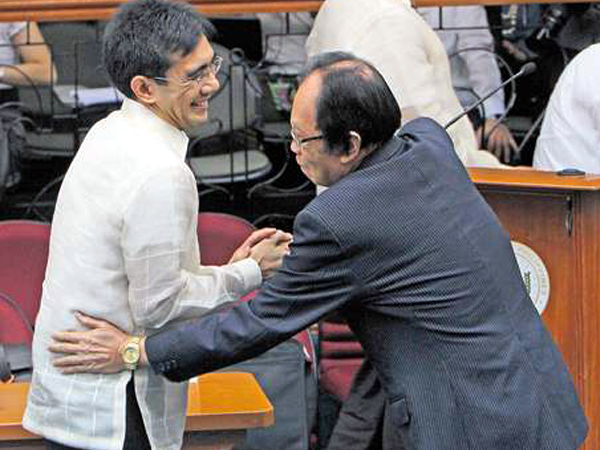From the
Inquirer.
The first day of Chief Justice Renato Corona’s trial was filled with ironies but bereft of the highly charged political drama that engulfed the nation 12 years ago, when then President Joseph Estrada went on trial for almost the same impeachable offenses.
Unlike the opening of the Estrada trial on Dec. 7, 2001, the hearing on Monday cannot be characterized as a political circus.
While both the prosecution and defense panels had traded barbs through the media in the weeks leading up to the Corona trial, there were no such fireworks on the Senate floor when the contending parties delivered their opening statements.
Unexpectedly, Senate President Juan Ponce Enrile stole the thunder from former Supreme Court Associate Justice Serafin Cuevas, head of the defense panel, and Iloilo Representative Niel Tupas Jr., the chief prosecutor of the House of Representatives.
Enrile, a veteran lawyer and defense minister in the Marcos dictatorship, took full control of the proceedings. He disposed off the pending motions and manifestations in a record time of less than two hours, and adjourned the hearing before any of the senators or lawyers could grandstand.
The defense had expected the Senate to allow a preliminary trial in an effort to declare void the articles of impeachment, which were transmitted by the House to the Senate last December 13, because of the haste with which the impeachment case was tackled by the Lower Chamber.
Neither Cuevas, despite his obvious legal acumen, nor Tupas, a rising star in the Lower Chamber, held sway in the opening salvo of the impeachment battle; they were not given enough time to expound on their respective positions, save for the perfunctory five-minute allotment to argue for or against the defense’s motion for a preliminary hearing.
Right at the onset Enrile declared that only the Senate could decide on matters pertaining to impeachment, a veiled warning to the high tribunal that the chamber, sitting as an impeachment court, would not be enjoined from proceeding posthaste with the trial.
Read the full article
here.
Aayyy!




Comments